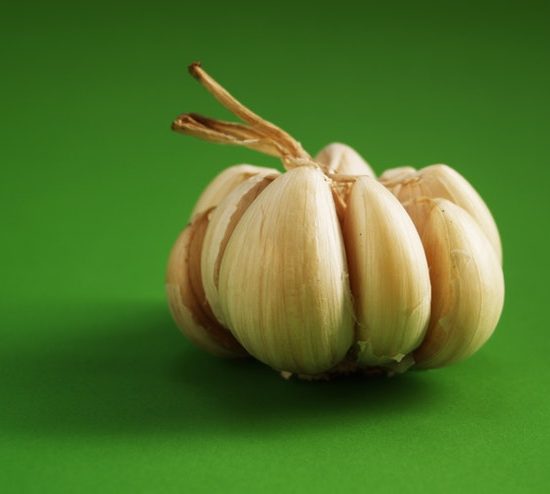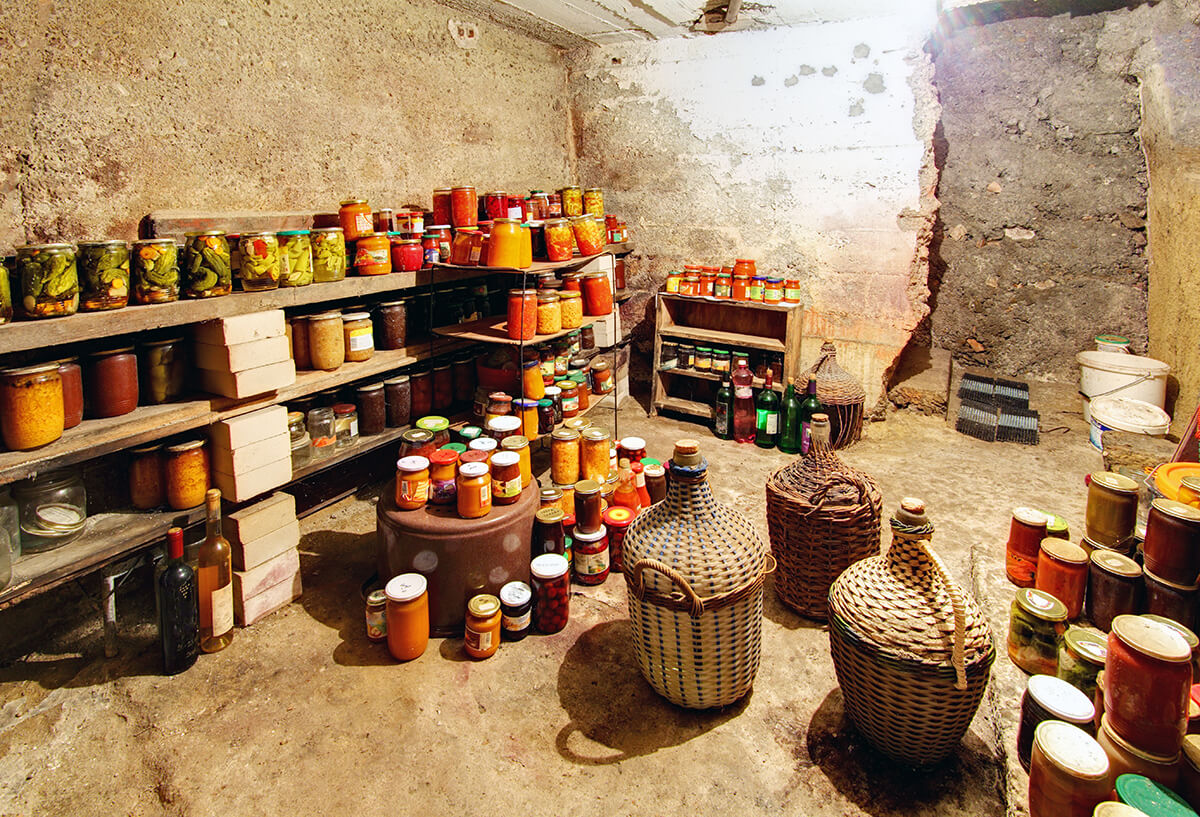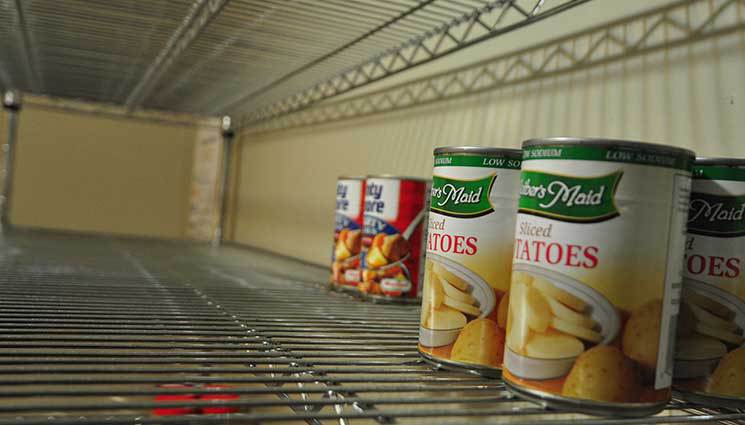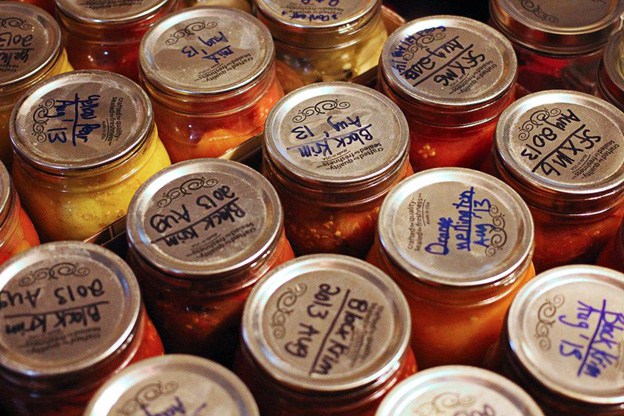
How do you know if your canned food has gone bad? If only it were as simple as checking the expiration date! Sorry friends, but that expiration date is just a recommendation. In truth, canned food can spoil due to many factors other than time spent on the shelf. For example…
- Dropping your canned food can create a hole or leak that allows bacteria to grow.
- Storing your cans at the wrong temperature can cause metals to start seeping into your food.
- Using the wrong methods or improper hygiene while canning will doom your food from the start!
This isn’t to scare you into thinking that all canned food is out to give you Botulism. Rather, we want to remind you to inspect your food before taking a bite!
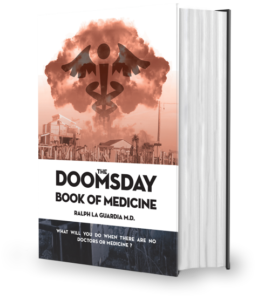
This book could have been called The Pioneer’s Book of Medicine. Learn here why.
Once we run through the telltale signs that canned food has spoiled, you’ll always know what to look for.
1. Bulging
Press on the lid of your can. Do you sense pressure or swelling? Or does the lid top “pop” or move up and down? These could all be signs of a serious food hazard! When bacteria breed, they release harmful toxins which cause the tin can to bulge.
From these toxins, humans can contract some nasty strains of food poisoning including the most lethal form of food poisoning called Botulism.
2. Loud Hissing
A soft, brief hissing sound when opening a can is fine–this is just the vacuum seal being released. However, a loud hissing sound is another sign of toxic gas caused by bacteria.
If you experience this hissing, stop – do not proceed. If you continue, you risk spreading the bacteria around your kitchen.
3. Spurting Liquid When Opened
When you open a can of green beans or tuna, there is always some liquid that pools at the top and spills out just a little bit. That’s natural. What isn’t natural, however, is spurting liquid that erupts like a geyser. This is a red flag that there has been an abnormal build up of pressure inside the can, likely caused by bacteria.

This Book Is The Noah’s Ark Of Prepping and it’s making Americans healthier by the day. Learn more here.
4. Corrosion
When metal cans corrode, metallic chemicals like Bisphenol A (BPA) start seeping into your food while also creating holes that allow bacteria to grow. Corrosion can be caused by improper temperature storage or being covered in soot or ash that moistens the cans. To spot corrosion, look for small rusty holes on the can.
5. Dents
When a dent is made on a can, it’s like a mini explosion going off on the inside. The air distribution is suddenly shifted and this can result in the can’s seal becoming compromised. If the seal is loosened, then air can escape and bacteria can enter, affecting both the taste and safety of the food inside.
6. Leaks
Leaks are the easiest way to tell if your can has been compromised! Don’t just look for liquid seeping out, also check for sticky areas which might be a clue that there was once a leak.
If there are holes, cracks, or issues with the seal that are big enough to cause a leak, then your food has been exposed to air, bacteria, and possibly egg-laying bugs that are attracted to the can’s contents.
7. Bad Smell
Smell your food every time you open a can. Obviously, rotten smells will gross you out and stop you from eating the potentially spoiled food. But also, acidic or metallic smells will strike you as unnatural. On an evolutionary level, your body is designed to detect “off” smells. Trust your senses!

You are as healthy as the soil feeding your plants. This book teaches you everything from the soil up. Get your printed copy here.
8. Bubbles
One or two small bubbles on the surface of canned food might just be from the agitation of opening the can. But if you find a light to moderate layer of foamy bubbles, then your food has spoiled.
These bubbles are caused by the release of waste or gas from the bacteria that has been partying inside the can. Treat this food like toxic waste and don’t even attempt to taste it.
9. Strange Colors
Your food should be the same color going in the can as it is coming out of the can–that’s the whole point of preserving in a can! Discoloration is a clear sign of contamination whether it be from metals, bacteria, or air. You don’t want to ingest that!
10. Mushy or Moldy Looking
If there is mold in or on your canned food, it means that your food wasn’t canned properly. The wrong tools or the wrong methods were used which resulted in the growth of mold that has begun to turn your food into mush.
In this case, it’s not enough just to scrape the mold off the top because you don’t know what other hygienic or handling issues occurred during canning.
How to Keep your Food from Spoiling
Store your cans in a dry, cool, dark place – Ideally, you want a clean storage shed, pantry or a basement that maintains a temperature between 40-60 degrees F. Most homes are around 70 degrees–which is okay–but in general, the lower the temperature, the longer your food will last.
Store your cans off the ground – Leaving your canned food on the ground exposes them to condensation, floods, and temperature changes. Shelves are your friend.
Physically rotate your food as often as possible – In other words, crack open the older cans first and replace them with newer cans. Don’t let cans of food go forgotten in the back.
If you want to learn more about home canning, check out these 9 things to know before you start.
Conclusion
Whether you’re stockpiling for the apocalypse, canning for winter, or eating from cans on a regular basis, make sure you really ingrain these signs into your brain!
Teach your partner and teach your kids these signs, too. They are survival skills that could save you and your family from enduring a serious illness.
Other self-sufficiency and preparedness solutions recommended for you:
The Lost Ways (The vital self-sufficiency lessons our great grand-fathers left us)
Survival MD (Knowledge to survive any medical crisis situation)
Backyard Liberty (Liberal’s hidden agenda: more than just your guns…)
Alive After the Fall (Build yourself the only unlimited water source you’ll ever need)
The Lost ways II (4 Important Forgotten Skills used by our Ancestors that can help you in any crisis)
The Patriot Privacy Kit (Secure your privacy in just 10 simple steps)
















